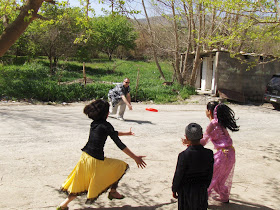This is a skill and a tool, something I really want to teach a class on. Learned correctly and utilized consistently it can lead to steady improvement anywhere. It was especially designed for emergency services and big operations, but I started using it on Uses of Force with my team in booking and in a few months we were preventing more incidents than ever, and those few we didn't prevent went smoother. It was one of the tools that allowed the Tactical Team to make such huge strides in such a short time.
The After Action Debriefing is simple, but it is also very easy to do half-assed or to misunderstand the intent. Then it is pretty much useless.
---Get all the involved people together. They are officially called 'stakeholders'. It has to be the people involved directly in the situation, as many of them as possible. If there are too many, each group does a mini AA and a representative brings the results to the big AA. Here's one of the things that makes me want to teach a class- I recently heard about a very highly placed, skilled and experienced administrator who wanted to get the AA done in a timely manner and held it with the next shift. Not the shift that dealt with the problem, but the shift that was present when the administrator arrived. At best, this will produce armchair quarterbacking on incomplete or inaccurate information. It could potentially change policy based on such bad information, which is worse.
Once the stakeholders are gathered, there are three simple steps:
1) Describe what happened. I usually start with a white board. Each person, one at a time, describes what they saw. From that, a time line goes up on the board. Very rarely will anyone remember things exactly the same. That's good. No one person's view will be complete. That's good too. There will even be contradictions. Don't worry about it. Once everyone's description is down* you will have a pretty good three-dimensional idea of what you are actually talking about.
2) What did we do right? This is important. Partially to keep it from turning into a bitching or blaming session, but also to validate your people. Generally, most things turn out far better than they could have. Everyone at the AA is breathing, for one thing. If you or the facilitator can't come up with anything good, the problem is in you and you need to remove yourself or the facilitator not only from the process but from the organization to avoid poisoning it.
3) What can we do better next time? Notice this is not, 'what did we do wrong?' This is for solutions and improvements, not for blaming or wallowing. No bedwetters allowed.
It is hard, but it is okay to say, "That went about as well as it could have." You need a strong moderator, because humans like to monkey with stuff and if you put them in a room and say, "Make it better" they will come up with something, and that something might be as stupid as installing a radio in an ice cube. The moderator also has to watch for 'unknowns'. Whatever decisions made were made with the information at hand. "If we had only known..." would have led to a better solution, but you can no more wish for information you don't have than for equipment you don't have. If someone can brainstorm a way to get that information under those circumstances, great. That becomes something you can do better- intelligence gathering.
The thing with the AA is that you get better every time. Most often it's just a small increase in skill or knowledge for a single team or individual- "Right, with that much OC the handcuffs were the only thing that weren't slippery. Good idea." Or a reminder on the super-basics, like communication. For some reason people forget to talk when they're amped.
Sometimes it's bigger and you find a hole in your training, something you have been told is true that might be true only sometimes or not at all. Sometimes you find a policy or practice that can be improved for safety and efficiency (but be careful with that one, because sometimes policies written to prevent danger can increase the risk from another direction or stifle creativity).
But sometimes I think the biggest value is the way that people who do this a lot come to see the world and think. It becomes a natural part of life to break it down: What am I really seeing? What's good about it? How can I make it better?
Not a bad way to live.
*You can debrief solo.


